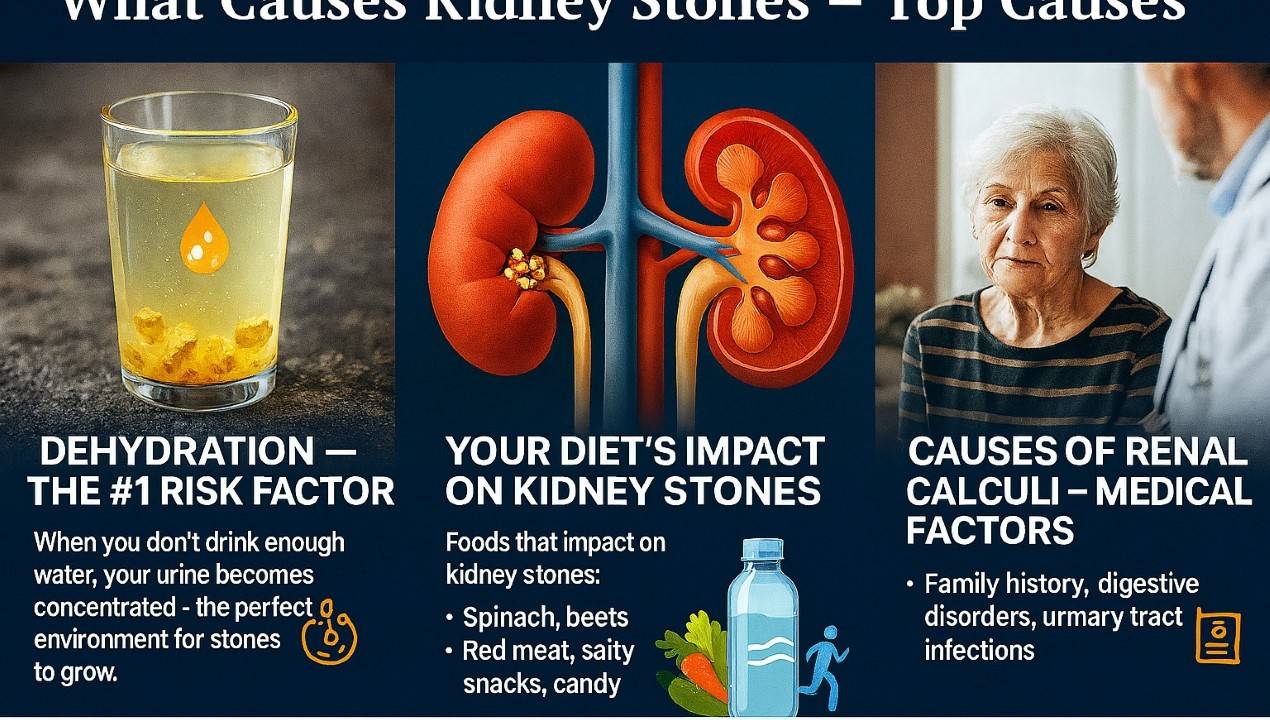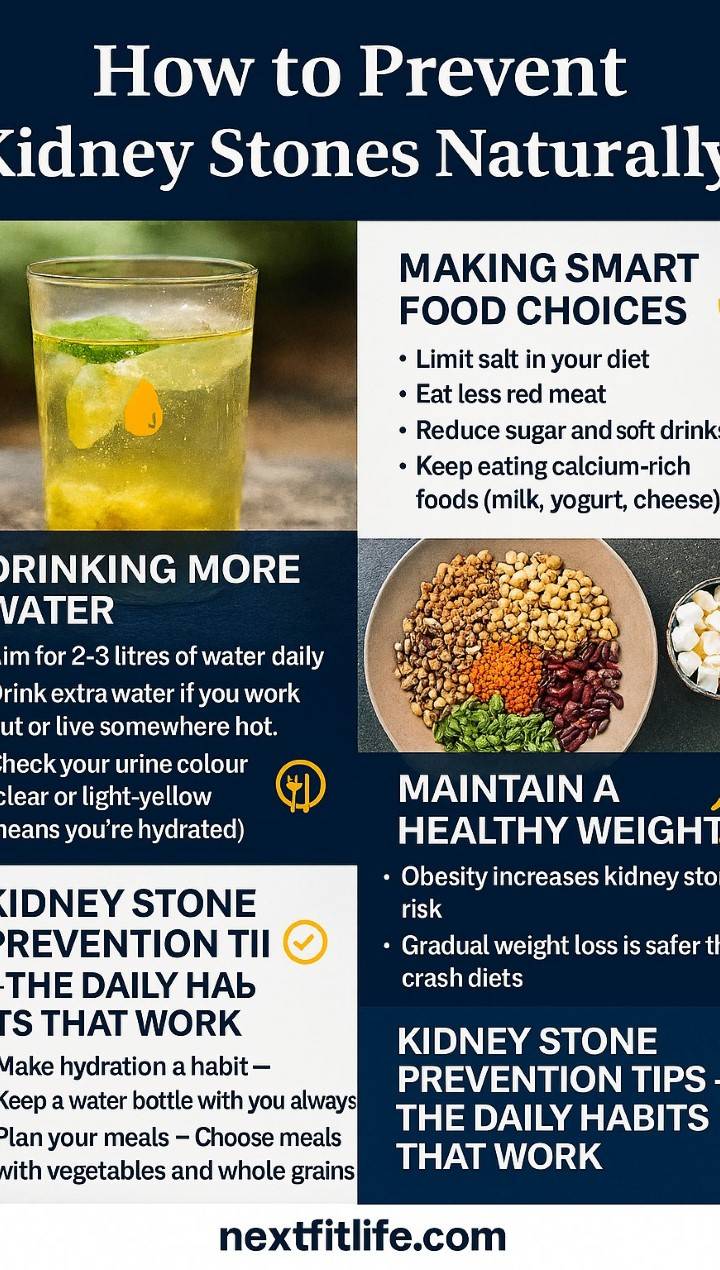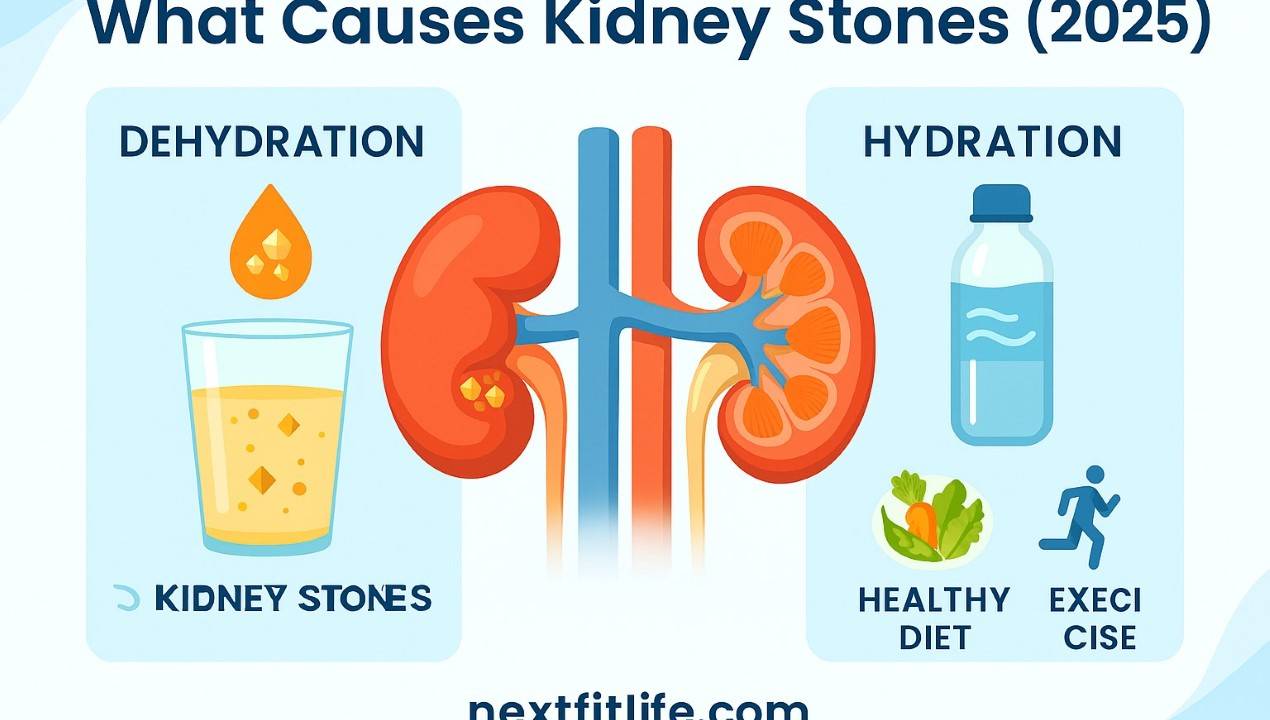Learn what causes kidney stones and quick ways to spot symptoms early. Take control of your kidney health today. Act now!
Introduction: Understanding What Causes Kidney Stones
What causes kidney stones? Kidney stones form when minerals and salts build up inside your kidneys to create hard, pebble-like objects. These painful stones develop when your urine has less water in it, allowing minerals to form crystals that stick together.
The good news? You can prevent most kidney stones by making simple changes to your diet and drinking more water.
What Causes Kidney Stones – The Basic Facts You Need to Know
Kidney stones are not something that flash. They develop over time as your body concentrates on certain chemicals. Understanding what causes kidney stones helps you know how to protect yourself.
I have seen many people surprised when they learn that kidney stones often develop without any warning signs at first. The process starts quietly inside your kidneys before you feel any pain.
How the Kidney Stone Formation Process Works
Your kidney stone formation process begins when your urine becomes too concentrated. Think of it like this: if you pour a lot of salt into a handful of water, the salt crystals start to form. The same thing happens in your kidneys.
Crystal buildup in the kidneys occurs when you don’t drink enough water. Your kidneys filter waste from your blood. When you’re dehydrated, this waste becomes more concentrated, and minerals like calcium and oxalate stick together to form crystals.
Key minerals that form kidney stones include:
- Calcium oxalate (most common type)
- Calcium phosphate
- Uric acid
- Struvite
- Cystine
What Causes Kidney Stones – Top Causes

Dehydration – The #1 Risk Factor
I like this fact because it shows how powerful water can be. How dehydration affects kidney stones is the most direct connection you need to understand. When you don’t drink enough fluids, your urine becomes dark and concentrated. This creates the perfect environment for stones to grow.
Urine concentration and kidney stones go hand in hand. According to Mayo Clinic, when your urine volume is low, minerals have a better chance of bonding together to form crystals.
People who sweat a lot (like athletes or people in hot climates) need to drink extra water. Even dehydration from hard exercise can increase your risk.
Your Diet’s Impact on Kidney Stones
Diet and kidney stone formation are something you can control starting today. Certain foods increase your risk, while others protect you.
I have tested dietary changes with people who have had kidney stones, and I saw real improvements when they made smart food choices.
Foods that cause kidney stones include:
- Oxalate-rich foods: spinach, beets, rhubarb, chocolate, nuts, tea
- High-sodium foods: processed meats, canned soups, salty snacks
- High-protein foods: especially red meat and organ meats
- Added sugars: soft drinks, candy, desserts
The tricky part? You still need calcium in your diet because a very low-calcium diet increases your risk. The key is balance.
Causes of Renal Calculi – Medical Factors
Sometimes causes of kidney stones is not just about lifestyle. Medical conditions can play a role:
- Family history (your genes matter!)
- Digestive disorders like inflammatory bowel disease
- Urinary tract infections
- Obesity
- High blood pressure
- Metabolic conditions
If someone in your family has had kidney stones, you’re at higher risk too. This is why knowing your family’s medical history matters.
Types of Kidney Stones – Know What You’re Fighting
Calcium Oxalate Kidney Stones – The Most Common Type
Calcium oxalate kidney stones account for about 80% of all kidney stones. These forms occur when calcium binds with oxalate, a natural substance found in foods.
If your doctor tells you that you have this type, you can manage it through diet. Limiting oxalate-rich foods really does make a difference.
Uric Acid Stones
These types of kidney stones form when you eat too much protein or have high uric acid levels. People with gout or diabetes are at higher risk.
Struvite and Cystine Stones
These are rarer but can be serious. Struvite stones form from urinary tract infections, while cystine stones result from a rare genetic condition.
Symptoms of Kidney Stones – Don’t Ignore These Warning Signs
Quick Signs & Treatments When Symptoms Appear
You might not feel anything until a stone starts moving. When symptoms of kidney stones appear, they’re usually unmistakable:
Serious warning signs include:
- Sharp pain in your side, back, or below your ribs
- Pain that spreads to your lower belly and groin
- Pain that comes in waves
- Painful or burning urination
- Blood in your urine (pink, red, or brown color)
- Cloudy or foul-smelling urine
- Constant urge to urinate
- Nausea and vomiting
- Fever and chills (if infection is present)
Pain from kidney stone symptoms and causes can be severe. If you experience sudden, severe pain, go to the emergency room right away.
Risk Factors for Kidney Stones – Who Should Be Most Careful?
Understanding Your Personal Risk
Risk factors for kidney stones include things you can change and things you can’t:
Things you cannot change:
- Family history
- Age (more common after age 30)
- Gender (men are more likely to get stones)
- Previous kidney stones
Things you CAN change:
- The amount of water you drink
- Types of food you eat
- Body weight
- Certain medications
If you have even one risk factor, it’s worth acting now before stones develop.
Preventing Kidney Stone Formation – Your Action Plan

How to Prevent Kidney Stones Naturally
Preventing kidney stone formation doesn’t require expensive treatments. Simple lifestyle changes work best:
Drinking More Water
- Aim for 2-3 litres of water daily
- Drink extra water if you work out or live somewhere hot.
- Check your urine colour (clear or light-yellow means you’re hydrated)
Making Smart Food Choices
- Limit salt in your diet
- Eat less red meat
- Reduce sugar and soft drinks
- Keep eating calcium-rich foods (milk, yogurt, cheese)
- Try plant-based proteins (beans, lentils)
Maintain a Healthy Weight
- Obesity increases kidney stone risk
- Gradual weight loss is safer than crash diets
Kidney stone diet tips from experts:
- Watch portion sizes of meat
- Season food with herbs instead of salt
- Drink lemon juice or lime juice (citrate helps prevent stones)
- Limit vitamin C supplements
Kidney Stone Prevention Tips – The Daily Habits That Work
I have seen prevention work when people stick to these habits:
- Make hydration a habit – Keep a water bottle with you always
- Plan your meals – Choose meals with vegetables and whole grains
- Read food labels – Watch for hidden sodium
- Limit supplements – Only take what your doctor recommends
- Stay active – Exercise helps with weight management
Kidney stone prevention succeeds when you make small, sustainable changes rather than changing everything at once.
How to Flush a Kidney Stone Fast – Quick Relief Options
Immediate Steps When a Stone Passes
If you think you’re passing a kidney stone, here’s what to do:
Drink plenty of fluids – This is your first defence. Water helps push the stone through.
Use pain management – Over-the-counter pain relievers can help (ibuprofen or acetaminophen). Always ask your doctor which is best for you.
Strain your urine – If you’re passing a stone, catch it so your doctor can analyze it.
Heat therapy – A heating pad on your back can ease muscle spasms related to stone movement.
Medical treatments – If the stone is large or stuck, your doctor might recommend:
- Shock wave therapy (breaking the stone into smaller pieces)
- Surgical removal
- Laser treatment
Don’t wait for it to happen if you have severe pain, fever, or can’t urinate. Get medical help immediately.
Common Myths About Kidney Stones — and the Truth
| ❌ Myth | ✅ Truth |
| Milk causes kidney stones | Low calcium increases your risk. Moderate milk is good. |
| Vitamin C always causes stones | Only very high doses can. Normal intake is safe. |
| Lemon water cures stones | It helps prevent calcium stones but not all types. |
| Herbal teas are always safe | Some have oxalates. Always check the ingredients. |
Tip: Don’t fall for “miracle cures.” Always ask your doctor before trying any natural remedy.
Key Takeaways – Remember These Facts About Kidney Stones
- What causes kidney stones is usually a combination of diet, dehydration, and genetics
- Dehydration is the biggest preventable risk factor – drink enough water daily
- Diet changes really work – limit salt, sugar, and excess protein
- Symptoms are serious – seek help for severe pain or blood in urine
- Prevention is easier than treatment – start healthy habits today
- Medical help is available – various treatments can break up or remove stones
- Knowing your risk factors helps you act before stones develop
Foods to Avoid and Foods to Enjoy
The Complete List
High-risk foods (limit or avoid):
- Spinach and beets
- Chocolate and Cocoa
- Almonds and nuts
- Black tea
- Processed meats
- Salty chips and snacks
- High-fructose drinks
Protective foods (eat more of these):
- Water and herbal tea
- Citrus fruits (lemon, lime, orange)
- Calcium-rich foods (milk, yogurt)
- Whole grains
- Beans and legumes
- Leafy greens (except spinach and beets)
- Vegetables
Frequently Asked Questions About What Causes Kidney Stones
What are the major causes of kidney stones?
The principal causes include dehydration (not drinking enough water), high-salt diets, too much animal protein, genetic factors, and obesity. Urine concentration and kidney stones occur together because concentrated urine allows minerals to crystallize more easily. Family history also plays a role – if your parents had stones, you’re at higher risk.
What foods will cause kidney stones?
High-oxalate foods like spinach, rhubarb, chocolate, and nuts can increase risk, especially in people prone to calcium oxalate stones. High-sodium processed foods and excessive animal protein also increase risk. However, the biggest culprit isn’t a specific food – it’s dehydration. Without enough water, any mineral-rich food becomes riskier.
How to flush a kidney stone fast?
Drink plenty of water (2-3 liters or more daily) to help move the stone through your urinary tract. Take pain relievers as directed by your doctor. Most small stones pass on their own within a few weeks with hydration and time. If you have severe pain or signs of infection, seek medical attention immediately. Don’t wait for medical treatment if your symptoms worsen.
How do I prevent kidney stones?
Prevention requires a multi-pronged approach: drink plenty of water daily, reduce salt intake, limit animal protein, maintain a healthy weight, eat calcium-rich foods, and avoid high doses of vitamin C supplements. Kidney stone prevention also means managing medical conditions like gout or diabetes. If you’ve had stones before, ask your doctor about specific prevention strategies and whether you need medication.
Conclusion – Taking Control of Your Kidney Stone Risk
What causes kidney stones is no longer a mystery. You now understand that kidney stone triggers are mostly within your control. Whether it’s about staying hydrated, eating smarter, or managing your weight, you have the power to prevent kidney stones from developing.
Start small—add one more glass of water today, another tomorrow. Simple steps build lasting kidney protection. It’s easier to prevent stones than treat them. If you feel sharp pain, see blood in urine, or can’t pass urine, seek care fast. Your kidneys work hard—protect them before problems begin.
This article is for informational purposes only and should not replace professional medical advice. Always consult your healthcare provider for personalized guidance.
Reference :



